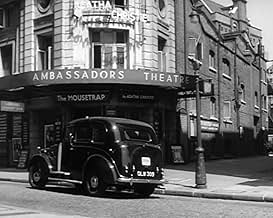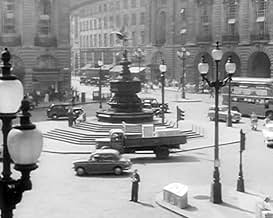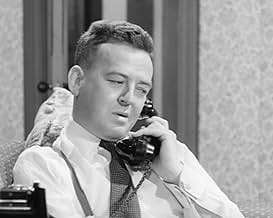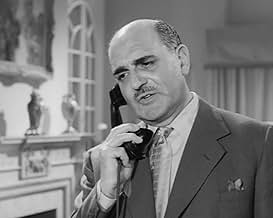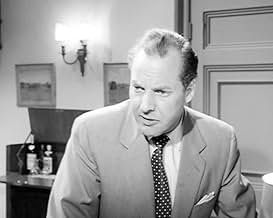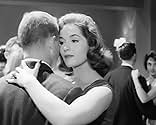अपनी भाषा में प्लॉट जोड़ेंThe wife of a night club owner frames an American writer for his murder.The wife of a night club owner frames an American writer for his murder.The wife of a night club owner frames an American writer for his murder.
John Adams
- Police Constable
- (बिना क्रेडिट के)
Jimmy Charters
- Man in Windsor Lad Pub
- (बिना क्रेडिट के)
फ़ीचर्ड समीक्षाएं
Alan Baxter or a statue or Alan Baxter? Which would you choose? Which did Charles Saunders actually pick for this rather silly and weak crime drama. He is "Selby" a writer sent over from the US to London to help promote a play being staged by "Bruce" (Charles Clay). As luck would have it, his remote hotel is owned by "Crawford" (Arthur Gomez) and guess what - that man's wife also happens to be an ex-girfriend of "Selby" who absconded with his last few bucks years earlier. She, "Liliane" (Barbara Shelley) and he quickly concoct a plan that will see them rob her wealthy husband and abscond with his collection of expensive jewels. Of course it all goes wrong - and soon poor old "Shelby" is wanted by the police for murder - but frankly, the hugely far-fetched plot had long since lost any lustre by the time we get to this stage. There is no chemistry at all to be had on screen and the writing and pace of the drama are pedestrian and sluggish as the characterisations trip over themselves to keep us guessing who anyone can trust and who is, ultimately, driving the game. It does feature some nice photography of late 1950s London, but that's hardly a reason to watch. Sorry - it's just dull.
This recently viewed feature is almost as bland as the washed out, whiter shade of pale print in which it appeared.
Everyone seems to be pulling out all the stops to give it the noir treatment: Alan Baxter is the obligatory American lead, retrospectively relating his ill fated encounters with siren Barbara Shelley, being needled by the sound of a familiar record, but still capable of a few cool colloquialisms, "The smart little number behind the desk," being a case in point. William Talman lookalike, Geoffrey Hibbert appears as a smarmy shady private dick. An unexpected twist creates faint echoes of Double Indemnity and it's all overlaid with a consciously trendy jazz score.
However, a pervading, quintessential Englishness drains the movie of any real grit or cutting edge. Much of the action takes place around leafy, affluent Marlow, with visits to the Windsor Lad pub and it's promo for Courage Ales. The then protracted process of making a phone call via the operator is conducted with decorum and dignity. Everything is so respectable, that even the chase occurs on attractive, rambling rural roads - Baxter's hot pursuit thwarted by a tractor hauling a cart loaded with hay blocking his path. All that's missing is the local yokel, with straw dangling from his lips observing from a nearby gate.
It is all fairly entertaining, but in an inescapably slight and superficial way. 'The End of the Line' manages to avoid hitting the buffers, but in spite of the rustic settings doesn't exactly pull up any trees either!
Everyone seems to be pulling out all the stops to give it the noir treatment: Alan Baxter is the obligatory American lead, retrospectively relating his ill fated encounters with siren Barbara Shelley, being needled by the sound of a familiar record, but still capable of a few cool colloquialisms, "The smart little number behind the desk," being a case in point. William Talman lookalike, Geoffrey Hibbert appears as a smarmy shady private dick. An unexpected twist creates faint echoes of Double Indemnity and it's all overlaid with a consciously trendy jazz score.
However, a pervading, quintessential Englishness drains the movie of any real grit or cutting edge. Much of the action takes place around leafy, affluent Marlow, with visits to the Windsor Lad pub and it's promo for Courage Ales. The then protracted process of making a phone call via the operator is conducted with decorum and dignity. Everything is so respectable, that even the chase occurs on attractive, rambling rural roads - Baxter's hot pursuit thwarted by a tractor hauling a cart loaded with hay blocking his path. All that's missing is the local yokel, with straw dangling from his lips observing from a nearby gate.
It is all fairly entertaining, but in an inescapably slight and superficial way. 'The End of the Line' manages to avoid hitting the buffers, but in spite of the rustic settings doesn't exactly pull up any trees either!
A corrective to anyone who thinks fifties Britain was perennially wet and overcast is this dour early Guido Coen quickie obviously shot during a hot, dry summer in those far off days when everybody smoked, phones had button 'A's and telephone exchanges still had human operators.
Like Fred MacMurray in 'Double Indemnity' crew-cut American import Alan Baxter narrates how he was ensnared by dragon lady Barbara Shelley (in arched eyebrows, painted nails and a polka-dot blouse) with a rich husband of more use to her dead than alive.
Good-looking but garrulous, it feels much longer than it's running time of only 66 minutes.
Like Fred MacMurray in 'Double Indemnity' crew-cut American import Alan Baxter narrates how he was ensnared by dragon lady Barbara Shelley (in arched eyebrows, painted nails and a polka-dot blouse) with a rich husband of more use to her dead than alive.
Good-looking but garrulous, it feels much longer than it's running time of only 66 minutes.
Alan Baxter is a writer in London to punch up a play for producer Charles Clay. He settles in a hotel in the suburbs, where he discovers Barbara Shelley. She was a girlfriend who walked out on him with his last hundred dollars. Now she's married to Arthur Gomez, who owns the hotel, a club in London, and runs a fencing operation. Baxter and Miss Shelley work up a scheme to rob Gomez' safe in the club with an ironclad alibi. But their plan goes awry.
Baxter is an immobile drip in the movie, who offers a voice-over commentary throughout the movie in a nasal, creaking voice. Miss Shelley is alluring, and the whole thing is shot cheaply by director Charles Saunders, resulting in a watchable, if mediocre film.
Baxter is an immobile drip in the movie, who offers a voice-over commentary throughout the movie in a nasal, creaking voice. Miss Shelley is alluring, and the whole thing is shot cheaply by director Charles Saunders, resulting in a watchable, if mediocre film.
I thought that this was a neat, well-crafted thriller with a few surprising little twists here and there.
Good performances by Barbera Shelley, who sadly died of COVID 19 earlier this year; and Jennifer Jayne, who can be seen alongside Conrad Phillips in The Adventures of William Tell, which is being rerun on Talking Pictures at the moment, on a Monday morning at 09:30; and Geoffrey Hibbert, who died in 1969 at the young age of 42. Jennifer Jayne is also no longer with us, having died in 2006 at the age of 74. All three actors are sadly missed for the great contribution that they made to British Television and Film.
The only thing that intrigued me about this film was the narration by Alan Baxter, who played the lead. Why was he referring to himself by the personal pronoun, "you", as if he was talking to someone else?
Good performances by Barbera Shelley, who sadly died of COVID 19 earlier this year; and Jennifer Jayne, who can be seen alongside Conrad Phillips in The Adventures of William Tell, which is being rerun on Talking Pictures at the moment, on a Monday morning at 09:30; and Geoffrey Hibbert, who died in 1969 at the young age of 42. Jennifer Jayne is also no longer with us, having died in 2006 at the age of 74. All three actors are sadly missed for the great contribution that they made to British Television and Film.
The only thing that intrigued me about this film was the narration by Alan Baxter, who played the lead. Why was he referring to himself by the personal pronoun, "you", as if he was talking to someone else?
क्या आपको पता है
- ट्रिवियाThe opening scene show London's Ambassadors Theatre with a board advertising "5th year" of "The Mousetrap", the Agatha Christie play. It opened in 1952 and is still running [2020].
- भाव
John Crawford: I want you out of the club in five minutes!
Charles Edwards: Be reasonable Mr Crawford. Alright alright I'll go. But you can't fool me. This isn't the real reason why you're firing me. And you know it as well as I do.
टॉप पसंद
रेटिंग देने के लिए साइन-इन करें और वैयक्तिकृत सुझावों के लिए वॉचलिस्ट करें
विवरण
- चलने की अवधि
- 1 घं 2 मि(62 min)
- रंग
इस पेज में योगदान दें
किसी बदलाव का सुझाव दें या अनुपलब्ध कॉन्टेंट जोड़ें

